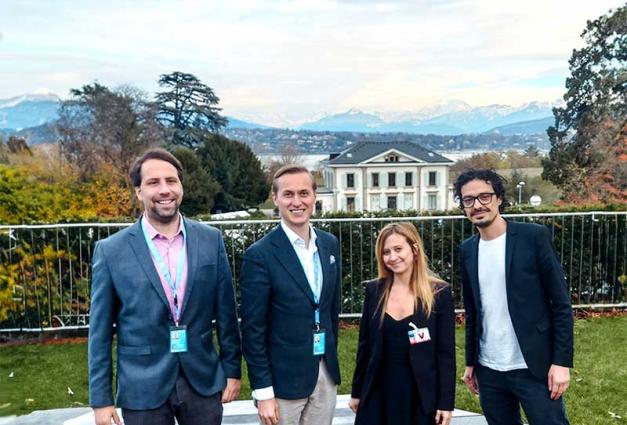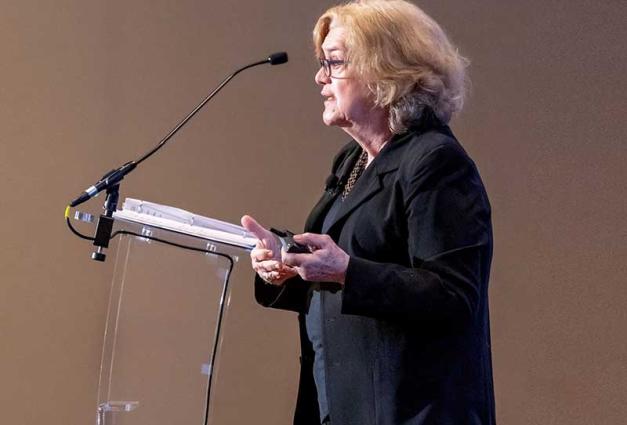Thanksgiving is a great time of year when we get to take a (short) break from the craziness of everyday life and spend some time with good company and good food. In addition to feasting, Thanksgiving is a great time to reflect on the things, and people, in your life that you feel grateful for. This month, we spoke with Professor Sara Algoe, an expert on gratitude, for her take on expressing gratefulness.
Sara Algoe is currently an Associate Professor in the Department of Psychology and Neuroscience at the University of North Carolina at Chapel Hill. At UNC, she is the Director of the Emotions and Social Interactions in Relationships (EASIR, pronounced “easier”) Laboratory.
How do you define gratitude?
My working definition of gratitude is an emotion that a person can experience when someone does something nice for them. Laypeople might define gratitude as the feeling they get when they have good things in their life. But, for scientific clarity, I call this second definition appreciation infused with affect.
Can you tell us about your Find, Remind, and Bind theory?
When other people do nice things for us we can have lots of different reactions. We might not notice, we might feel beholden to them, or even wonder why they did this. But sometimes we feel grateful. This theory identifies the situation under which we feel grateful, and then what that gratitude might do. When we do experience gratitude for another’s kindness, we see that they that are motivated to look out for us. This recognition is the beginning of a gratitude detection and response system that helps up identify who will make a good relationship partner and then psychologically bind more closely to those people as a response.
What makes gratitude so special and who does gratitude help?
One reason that I can’t stop studying gratitude is because there are so many facets to it. Think about this situation: Jim does something nice for Mary, then Mary feels grateful. Then, her gratitude inspires her to try to make sure Jim feels good in return, and then they both feel positive about their relationship. While it all probably started from benevolent motivation, each party can reap rewards afterward and both people win; over time, this can build up to improve relationships.
What are the benefits of showing gratitude and do these translate to platonic relationships?
In our research with romantic partners, we see that people who experience gratitude for others see the other person in a better light, feel more satisfied in their relationship, feel better about their relationship, have positive feelings of love, have a greater perception of partners' responsiveness, and even report greater satisfaction in life.
These effects should carry over to other types of relationships as there is some experimental evidence focusing on gratitude between strangers. Additionally, other work with roommate pairs suggests that this should apply to platonic relationships.
People who experience gratitude naturally want to make sure the other person knows how much they are appreciated. A common form of gratitude is simply saying “thank you.” This has come to signify the natural experience of gratitude, but people might just say it to be normatively appropriate, which can be perceived as insincere. When you’re expressing gratitude it seems to have the biggest impact when you call out what it was about the other person's actions and how praiseworthy these were.
Not everyone has positive relationships with their families, but can gratitude still be helpful?
Any opportunity to express gratitude is a great chance to do it, even just one day or little doses is a start! Thanksgiving is one of my favorite holidays because of the opportunity to express gratitude. Personally, at my Thanksgiving gatherings, I like to go around the table and have everyone say something they feel grateful for.
Interpersonal difficulties with family members and friends are tough, but even if there's one thing you feel grateful for, try to acknowledge it!
What are the barriers to expressing gratitude regularly?
Barriers to experiencing gratitude can be too much self-focus or self-absorption, and even very kind people can be self-absorbed due to things like stress. One way to find more opportunities to experience gratitude is to pay attention to what others are doing around you and for you.
For example, if someone does something nice for you, it’s important to recognize that they didn’t have to do that nice thing. And if you experience it [gratitude], don’t forget to express it. It might get harder as time passes, but it doesn’t matter how much time has passed, people still like to know that you are appreciative.
How does gratitude look different across cultures?
In a study led by my graduate student, Yen-Ping Chang, we tested the hypothesis that gratitude really does function to bind and shore up relationships and that there could be social behaviors that are best for demonstrating gratitude in different contexts. We found that the specific behavior used to show gratitude is situation-dependent and relies on the relational or cultural context. And that gratitude is more likely to be perceived as such when it falls in line with relative cultural norms.




